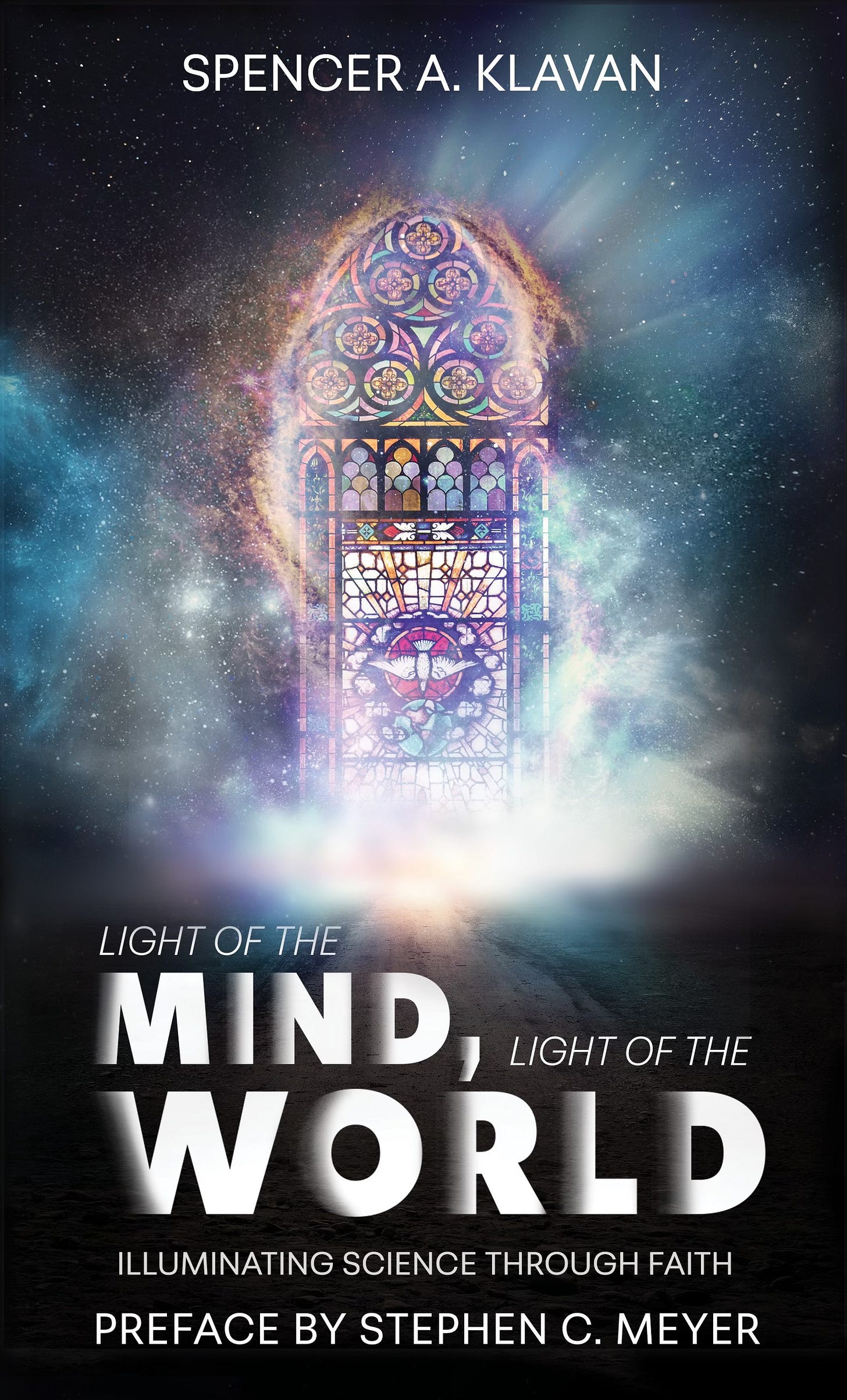This month’s essay introduces the new book Light of the Mind, Light of the World, out next week. Its spirit is the spirit of The New Jerusalem. Pre-order here.
If I knew anything for sure growing up, I knew this: smart people don’t believe in God, and people who believe in God aren’t smart. This was the ambient presumption among my peers, hard-charging and gifted young strivers in a chic suburb of California. It was communicated explicitly to us by our intellectual heroes like Christopher Hitchens and Stephen Hawking, men whose dazzling insight and lightning eloquence we longed to imitate. It was often reinforced by our teachers, who showed us how to erect a firewall between our personal convictions and our rational minds. Faith, even if you personally had it, went on one side of that wall. Genius went on the other. Everyone basically knew this.
Nowhere was the division between intelligence and religion more clear than in science class. And science was, in turn, the essence of truth. Only what could be measured, charted, and calculated could be known for sure. Even those of us who specialized in the humanities were in awe of the pristine clarity we found in the logic of differential calculus, the way its elegant formulas unfurled in our minds to chart a map of the world.
Reality to us was bodies in graceful motion, locked in perfectly balanced relationships by the forces that rule all things. Truth was described with ironclad exactitude by numbers and figures. To see this, you had to shelve whatever you believed about God and purpose, about any cosmic order besides the one described by mathematics. Faith just got in the way.
Though we didn’t quite understand it then, this idea had taken hold of the Western mind over centuries. We were heirs of a tradition stretching back at least to Francis Bacon, who in 1620 urged the readers of his New Organon to cast aside what he called “idols of the mind.” Inherited assumptions, Bacon argued, clouded the vision of otherwise brilliant men. This included many believers who, “from their faith and religious veneration, introduce theology and traditions” into realms where hard data ought to be sovereign. Worshippers of truth must come to her temple in purity of heart, leaving behind all they thought they knew of God.
It made a certain degree of sense. It’s said that Pierre-Simon Laplace, one of the greatest astrophysicists of the Enlightenment or any other period, was once quizzed by Napoleon on the absence of a divine power from his account of the universe. Laplace gave a legendary reply: “I had no need of that hypothesis.”
This was only a gentler expression of the sentiment expressed by the polemicist Voltaire, himself a breathless admirer of Isaac Newton. Écrasez l’infâme, Voltaire demanded of his readers: “crush the hateful thing.” By this he meant that the strictures of Christian orthodoxy must be torn violently to pieces to keep them from hobbling the seekers of true wisdom.
Newton himself would have been horrified at this notion. But in the wake of his death, the sheer power of his physical laws so enchanted the acolytes of reason that they felt determined to cast off supernatural ideas and gaze lovingly on bare material facts. Gradually, the conviction set in: the truth was matter in motion. Everything else was airy fiction.
By the time my generation came of age, this had become a truism. In his 1927 essay “Why I Am Not a Christian,” the mathematician and popular philosopher Bertrand Russell wrote that “religion is based, I think, primarily and mainly upon fear.” Thankfully, “in this world we can now begin a little to understand things, and a little to master them by the help of science.” John Lennon, channeling the spirit of the times in 1966, casually told an interviewer that “Christianity will go. It will vanish and shrink. I needn't argue about that; I'm right and I will be proved right.”
With the rise to fame of New Atheists like the evolutionary biologist Richard Dawkins, those in the know came to take it entirely for granted that The God Delusion, as Dawkins called it, must fade into the background to make way for science. “As a scientist, I am hostile to fundamentalist religion because it actively debauches the scientific enterprise,” Dawkins wrote.
Even a pioneering cosmologist like Georges Lemaître, the Catholic priest who peered into the origins of the universe and discovered what would become known as the Big Bang, hastened to insist that his theory was “the antithesis of the supernatural creation of the world.” To be taken seriously as a scientist, he had to make a show of keeping his faith out of the picture.
But if it once seemed reasonable for experimentalists to police their territory against intrusive clerics, by Dawkins’s day the partisans of godless science had become small-minded and baselessly defensive in their own right. The idea I grew up with, that religion is a threat to true knowledge, has hardened into a dogma every bit as brittle and suffocating as any church teaching. In my new book, Light of the Mind, Light of the World, I argue that science itself has left that dogma well and truly in the dust. It is time to tell a new story.
Recently I met a man about my age, the son of a Lutheran pastor, who told me that his previously unbelieving friends had started to worship God without any evangelizing from him. These were computer scientists and engineers, serious thinkers working in the cutthroat fields of high tech. Like the cowled mystics at the far end of the bell curve meme, they were flocking unbidden to the supposedly antiquated rites of the traditional church, kneeling at the altar rail to receive communion.
It’s an image that would have shocked and perplexed me not too long ago. The pastor’s son himself was so alarmed that he started playing devil’s advocate, arguing against God’s existence to test whether his friends were just trying to please him. But he couldn’t talk them out of it: they had been firmly convinced by their scientific work.
Sitting at their computers for hours on end, these coders had started to wonder just how it is that a human mind, faced with abstractions like “1” and “0,” can introduce structure and order into the world such that a program—a fresh creation—comes into being. No system can generate new information spontaneously, without the addition of knowledge from outside.
For that matter, how could a singularity—the miniscule pinpoint that seethed with raw potential at the beginning of the universe—simply burst into existence on its own? Relativity and quantum physics suggest that even our most basic physical categories, like space and time, are products of an interaction between consciousness and matter. So is Big Bang theory “the antithesis” of the Book of Genesis, or its analogue in the language of science—a formless void brought into the light of being by a watching mind?
For all the wonders that science has discovered and will yet discover, these kinds of questions cry out for answers. They are not solely academic. The tired old assumption, that the world is a dead machine and we’re just living in it, leads naturally to the belief that humanity itself is expendable—that we are, as Stephen Hawking once said, “a chemical scum on a moderate size planet.”
If so, then why shouldn’t our machines, rapidly outpacing us in terms of quantitative horsepower, do away with us and rule the world? If we are nothing more than what Oxford’s Elise Bohan calls “ape-brained meatsacks,” then the accident of our genesis from a primeval slop will soon be a forgotten bubble in the endless stream of atomic flow. All the dreams we dreamed along the way—the towering aspiration of our greatest architecture, the longing heartache of our poetry and art—will vanish like shadows.
But nature itself is pointing in a different direction. “There’s only one place” where we know for sure that the jumble of quantum potential becomes reality, explains science writer George Musser in Putting Ourselves Back in the Equation. That one place where reality coheres is in the experience of a human mind: “The waves that ripple through the quantum ocean break on the shores of our conscious selves.” We are not so expendable after all.
The time is ripe for a remarriage of reason and revelation. In the wake of landmark books like Tom Holland’s Dominion and Stephen Meyer’s Return of the God Hypothesis, first-rate thinkers like Ayaan Hirsi Ali have concluded that we can’t survive on mere secular prejudice. Those once in thrall to the unthinking atheism of a bygone age are coming around to a new and intellectually vigorous faith. I was one of them. I’m not alone.






I grew up without religion. By the time I attended my performing arts high school I was affirmed in that because all teachers and students loudly professed that religion was for the unthinking, non intellectuals. But I was ravaged with sorrow and the pain of the world. In a desperate attempt to find relief, I said a prayer. It changed my life and my worldview entirely. My simple plea to God was that I might find joy in my life, true joy. And I immediately received an answer that (had it not been so powerful an experience) I would have scoffed at: go to church. I laugh at this answer now too sometimes as many Christians attempt to separate their belief in Him from the church they attend, but my learning to attend church first before believing taught me the value of our sacred rituals and practices. It’s almost as if it has its own science. Or that it was all related all along.
In my early 20’s I was an atheist studying string theory, quantum mechanics, and computer science.
One night I had a dream where I said to a crowd of people, “I believe in God because we live in an objective world that permits subjectivity.”
In the dream, the crowd of people looked at me and nodded affirmatively.
I woke up and thought, “Do I really believe that?”
I had to admit it passed my filter of reason.
It would be years before I investigated the western tradition, but I did so with a logical basis, an admission that of all possible universes, the one we live in is astonishingly good.